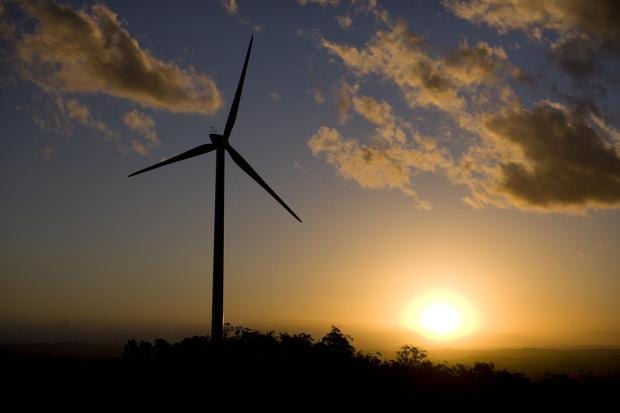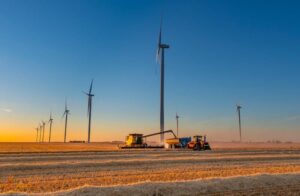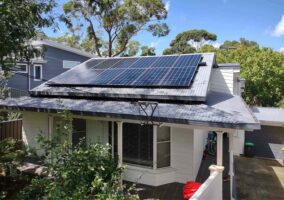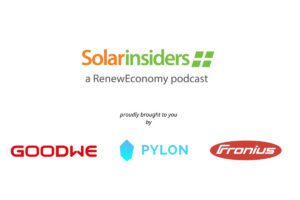With the Coalition government set to review Australia’s 2020 Renewable Energy Target early next year, Australia’s biggest utility, Origin Energy, has declared that the nation has already nearly met its 20 per cent goal for renewables penetration, and that any further mandatory target would only further drive up the cost of electricity.
In his address to the annual general meeting today, Origin Energy chairman Kevin McCann said Australia’s largest energy retailer believed the 20 per cent target was “already nearly met,” and that additional mandatory investments in renewables would only further increase the delivered cost of electricity to consumers.
“We believe (Coalition) government should use the next scheduled review of the scheme in 2014 to review its effectiveness,” McCann said, adding that Origin looked forward to working with the new federal government, with its plan to replace the carbon price with a Direct Action policy. “If well designed, this policy can make an effective contribution to reducing Australia’s carbon emissions,” he said.
McCann did not explain how Origin arrived at the “nearly met” 20 per cent target. A recent assessment by Pitt&Sherry – also discussed here – suggested that the penetration of renewables in Australia’s market was no more than 15 per cent in 2013. That, however, is ahead of the timeline.
Origin Energy managing director Grant King – who today agreed to extend his contract as head of the gentailer – has consistently argued that the current LRET, which calls for 41,000GWh of renewable energy to be delivered by 2020, is failing to stimulate technology innovation, while delivering a high cost of abatement, and has canvassed the idea of pushing the target out to 25% by 2025, or even 30 per cent by 2030.
In an interview with RenewEconomy in August – before the federal election – King suggested that the LRET should be pushed out even further, with higher targets by an even later date, because the current target was not delivering on its objective.
McCann’s remarks, and the continued push to have the RET reviewed, came as Origin Energy – with its 30 per cent share of the Australian energy market – was accused of actively blocking renewables, in a new report produced by Greenpeace Australia and local NGO 100% Renewable.
The report – Strangling Renewables: Origin Energy’s campaign against renewable energy – suggests Origin’s stance on renewables is part of a broader strategy to prolong the dominance of gas and fossil fuels.
It notes that Origin was once a strong supporter of government policy to stimulate greater investment in renewable energy – a position it has changed since investing substantially in gas projects, including a $24.7 billion LNG project in Queensland, and nine gas energy generation plants with a combined capacity of 2541MW.
Both of these investments – as well as the fact that Origin generates 75 per cent of its profit through its retail arm – were threatened by the increased penetration of large- and small-scale solar and wind, said the report, which had already contributed to falling electricity demand and prices.
“To shore up its strategy of expanding investment in gas and fossil fuels, Origin is responding the only way it knows – by leading an industry campaign to undermine renewables in our community,” said Lindsay Soutar, national director of 100% Renewable.
“As this report shows, Origin is strangling renewable energy in a number of ways, including running a smear campaign against the renewable energy target, which sets Australia’s goal for the amount of our energy produced by renewables, and using misleading public statements to manipulate the general public and politicians alike,” Soutar said on Wednesday.
“Origin’s Managing Director, Grant King, has repeatedly said the renewable energy target is a primary driver of increased energy costs. But, that is inaccurate, with the main cause of price rises – at over 70% – due to over investment in poles and wires.
“Two and a half million Australians have installed rooftop solar and are taking power generation into their own hands. These families are producing clean energy and, at the same time, reducing their bills.
“In truth, renewables are working,” Soutar said. “As this report shows, renewables are reducing energy bills and producing clean energy in an efficient way. Not only that, but wind power is lowering wholesale power prices. And other countries are surpassing us with more ambitious renewable energy goals.
The report notes that globally, nearly 70 countries have renewable energy targets, many of which are higher than Australia’s, including: Sweden, with 60 per cent by 2010; Canada, with 90 per cent by 2020; and the Philippines, with 100 per cent by 2050.
Ben Pearson, from Greenpeace Australia, added that Origin appears to have underinvested in its own renewable energy portfolio, while using its market power to block other clean energy projects from going forward.
“What Origin is failing to recognise is that Australians overwhelmingly support renewable energy,” Soutar said. “Survey after survey finds that 70-80% of families want more renewables – not less. At this time we need to be increasing our ambition – not falling behind.”







